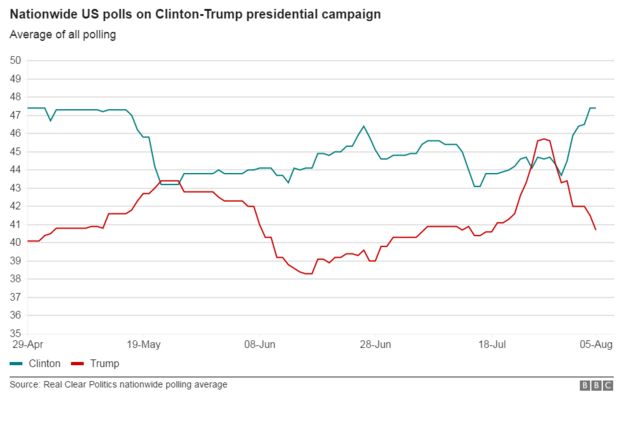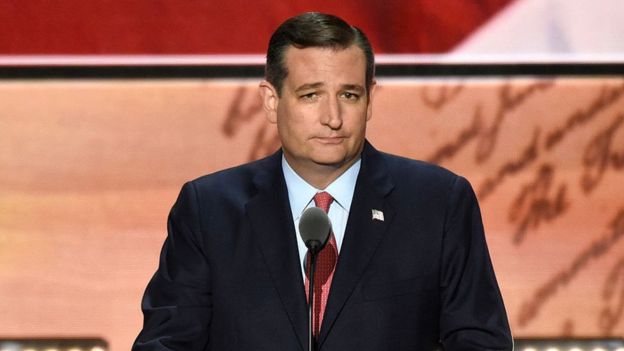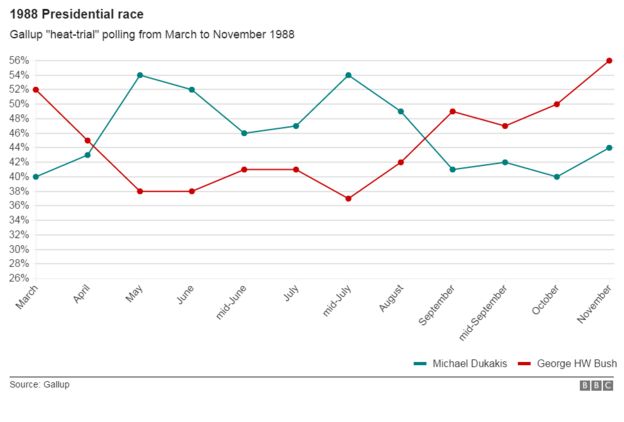Trump Springing Leaks All Over Going Down or Is it Too Early to Sink?
Like a boxer on the ropes, the Trump campaign has weathered a flurry of body blows over the past few weeks. Is this the beginning of the end, a full three months before election day? Should Donald Trump throw in the towel before the inevitable November knockout?
The latest round of national polls has set off something akin to a mass panic among Republican officeholders and intelligentsia, with some wishing Mr Trump would just quit already and leave them to pick up the pieces.
Here's why.
Hillary Clinton is up seven percentage points in a CBS survey, nine in CNN and NBC, an eye-popping 15 in a Marist survey that had the race within the margin of error just a few weeks ago. She's posting sizeable leads in key swing states like Pennsylvania, Michigan, New Hampshire and Florida. She's even leading in Georgia, a state Republican Mitt Romney carried by 8 percentage points.
August polls are notoriously fickle, of course, and a Clinton bump was always expected - a typical result following a successful national party convention.
This surge, however, has the feeling of something more substantive, given that it comes on the heels of a series of Mr Trump's unforced errors.
The Republican standard-bearer suggested Russia should hack Mrs Clinton's emails. He fought with the parents of a slain Muslim-American soldier in Iraq and feuded with Republican congressional leaders, including Speaker of the House Paul Ryan.

These were just the headliners, too, nestled among a series of lesser gaffes. Mr Trump reportedly questioned why the US doesn't consider a first-use nuclear policy, insisted that Russia would never invade Ukraine, suggested women who are sexually harassed at work should find other employment, made jokes about a crying baby at the mother's expense and rehashed a series of old political feuds, such as his off-colour remarks about Fox News host Megyn Kelly.
Through much of the late spring, potential head-to-head matchups gave Mrs Clinton a steady, if unremarkable advantage. The conventions presented Mr Trump with his best opportunity to reshape the electoral playing field - part of a pivot that his campaign chairman Paul Manafort was quietly promising to party leaders.
For a while that seemed to be how things were playing out. Mrs Clinton was staggered by an FBI rebuke of her use of a private email server while secretary of state. Mr Trump pulled ahead in several July polls. The Republican Party rank and file were dutifully falling into line.
The national spotlight of the Republican convention offered the opportunity for Mr Trump to cement this trend and capitalise on the natural strength of a presidential challenger running against a party looking for a third straight term in office.
Instead it has all come unglued. The doom-and-gloom Republican convention was a historic bust, leaving - according to one poll - Americans who watched it less likely to support Mr Trump. The head-to-head deficit with Mrs Clinton has re-emerged and grown, suggesting an anti-Republican equilibrium that could prove difficult to disrupt and threatens to swamp the party's down-ballot congressional candidates.
As a result some Republicans in at-risk districts have begun openly runningagainst their nominee. Meanwhile party insiders are left comforting themselves with thoughts that while they weren't able to block Mr Trump's successful primary campaign, maybe - when faced with an election that seems destined to end in humiliating defeat - he could commit political seppuku and allow the party to hand-pick a replacement.
"I'd rather take our chances with nearly anyone else than continue with this certain loser who will likely cost the Senate and much more," an anonymous New Hampshire Republican tells Politico.
Such scenarios, however, are wishful thinking in the extreme. No one emerged as a viable Trump alternate during the Republican primaries, so who is the mystery Republican the party would flock to?
The reviled-by-many Ted Cruz? Vice-presidential nominee Mike Pence, who was in a dogfight in his home state just to win re-election? Would House Speaker Ryan or 2012 nominee Mitt Romney willingly walk into a buzz saw of scorn from Trump faithful?
Not that it matters, since Mr Trump has spent most of the past year successfully defying predictions that his campaign is on the brink of collapse. Why would he pay heed now?
 GETTY IMAGES
GETTY IMAGES
Mr Trump is drawing tens of thousands to his rallies. While this may be irrelevant in a national electorate that numbers in the hundreds of millions, the adulation of crowds is catnip to even the most jaded of candidates.
Then there's the torrent of money that Mr Trump has unleashed - more than $80m (£61m) in July, thanks to a flood of small-donor contributions.
Presidential hopefuls with enthusiastic audiences and campaign coffers full of cash aren't prone to humble exits.
Ever since Mr Trump descended that golden escalator to announce his candidacy last July, his campaign has been a roller-coaster ride for the Republican establishment, alternating between reluctant acceptance and sky-is-falling hysteria.
This week has marked one of the more pronounced troughs in this journey, but the general election sprint is only just beginning. There may still be peaks of resigned accommodation ahead.
If Mr Trump can get back on message with a few carefully modulated speeches and at least a handful of news cycles without outrageous statements, the polls could again narrow to within a more typical partisan split. There's nothing the media like more than a good candidate comeback story.
The debates - assuming Mr Trump participates - start up in late September. They present another, possibly final chance for the Republican to reshape the race.
That may be a tall order for a candidate who was at times shaky during the primary debates and largely benefitted from a stage crowded with competitors, placing a premium on quick jabs and downplayed substance. It will be harder to skate by on style alone in a 90-minute two-person presidential face-off.
Back in 1988 another candidate was seeking a third-straight presidential term for his party. George HW Bush had started ahead early in the year, but Democrat Michael Dukakis made headway over the summer and carried a solid lead through the Democratic convention.

By September, however, the advantage had vanished, and Mr Bush cruised to victory.
Lee Atwater, Mr Bush's campaign manager, used to tell a story about how the number of people Americans viewed as presidential calibre could fit in a small boat. The goal of a campaign, he said, was to push the opponent overboard.
In 1988, thanks to Atwater's withering negative campaign, Mr Dukakis suffered that fate.
According to most public surveys, Mr Trump is well outside of Atwater's boat right now. Perhaps he's never been in it.
For more than a year Mr Trump has seemed to be operating in an impregnable submarine - immune to his opponents' more traditional attacks and spraying torpedoes at his hapless adversaries.
Now his vessel is at last springing leaks - and while Democrats have been trying their best to sink him, the gravest damage may be of his own making.
Comments